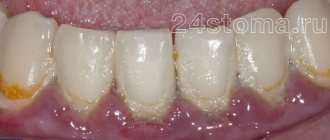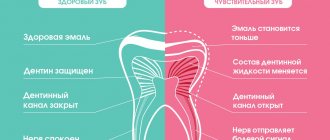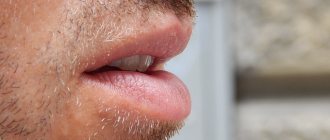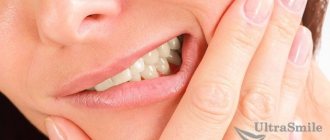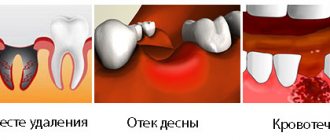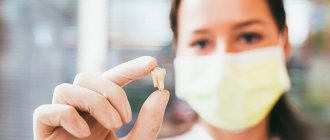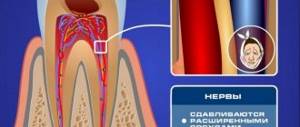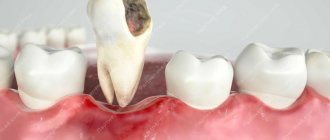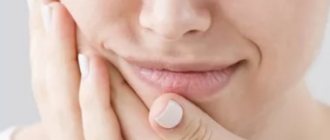The jaw may hurt near the ear on the right or left; it is usually painful for patients to chew and speak; sometimes the pathology is accompanied by an increase in body temperature. Pain can occur only when pressed or at rest, be burning or aching. There are many combinations of pain syndromes, and each indicates a specific lesion. Therefore, doctors first conduct a detailed survey of the patient, and after that they prescribe additional clinical and laboratory tests - MRI, radiography, general blood test.
Why does the cheekbone hurt, the jaw near the ear on the left and right, it hurts to chew: reasons
Why does the cheekbone hurt, the jaw near the ear on the left and right, it hurts to chew: reasons
If there is pain in the jaw, then you don’t need to flatter yourself with hopes that it will go away on its own. This symptom occurs when a serious disease appears that needs to be treated. If this is not done in a timely manner, the condition may worsen and the disease may develop into a chronic stage.
Causes of pain in the cheekbones, jaw near the ear on the left and right, and when it hurts to chew:
- Diseases of the dentofacial apparatus, gums and temporomandibular joint . These problems are dealt with by dentists and maxillofacial surgeons. If jaw abscesses and phlegmon occur, you will need an operating dentist.
- Inflammation of the sinuses . On the sides of the nose are the maxillary sinuses, and behind the ear is a cavity located inside the process of the temporal bone. The mucous membrane of this cavity can become inflamed and cause aching pain in the cheekbone area. An ENT specialist deals with such problems.
- Diseases of the larynx, tonsils and tissues around them. The disease appears as a result of a purulent-inflammatory process, an infectious disease and a tumor. An ENT doctor can cure such a pathology.
- Disease of the peripheral nervous system. Nerve cells become inflamed, causing swelling and pain. You should contact a therapist or neurologist.
- Inflammation of the lymph nodes . They become inflamed if infected lymph from the nose, larynx or ears enters their tissues. Diseases of this system are dealt with by general practitioners or pediatricians (in children).
Why does my cheekbone hurt, my jaw near my ear on the left and right, why does it hurt to chew?
If diseases are started by delaying a trip to the doctor, then other concomitant, no less complex pathologies may develop:
- Purulent and inflammatory processes: abscesses, phlegmon.
- Infections in the mouth, nose or ears.
- Dysmetabolic abnormalities in electrolyte balance.
- Injuries - can occur due to strong opening of the mouth when yawning, opening bottles and other hard or metal caps with the teeth.
- Benign and malignant tumors.
- Inflammation of peripheral vessels and nerves.
If your jaw hurts after going to the dentist or having a tooth removed, you should immediately contact a specialist. A consultation may not be necessary if braces have been installed. In this case, mild or tolerable pain occurs during the formation of a correct bite. But, if this condition does not go away after 2 months, then a consultation with the treating dentist is necessary.
Why does my cheekbone and jaw near my ear hurt on the left and right?
Important: You should contact a trauma surgeon if your jaw or cheekbone begins to hurt after an injury. In this case, pain can arise either from a banal bruise or from a serious fracture, dislocation or abscess.
Why the jaw near the ear may hurt, depending on the location of the pain
Pain localized in the upper jaw can be caused by sinusitis. The disease develops against the background of injuries to the skull and nose, prolonged hypothermia, pulpitis and periodontitis. Sinusitis can be identified by the following signs: nasal congestion (usually one nostril), thick mucus or pus discharge when blowing the nose, a nasal voice, elevated body temperature.
The area of maximum pain sensitivity is usually located near the nose, but in advanced cases the pain can spread to the entire face. Sometimes the disease affects the paranasal sinuses on both sides, but most often it is unilateral. If the patient's jaw hurts only near the ear on the left, and it does not hurt him to chew on the right side, it means that inflammation develops in the sinuses located on the left.
Pain in both the upper and lower jaw occurs for the following reasons:
Osteomyelitis is an inflammation of the jaw. It develops as a result of unprofessional treatment of sinusitis, tooth extraction, implant installation, or sinus lift. The disease is accompanied by an increase in temperature, the pain may radiate slightly to the left or right lower jaw.- Gingivitis is an inflammatory process in the soft tissues of the gums. This disease is characterized by aching pain and bleeding gums. Additional symptoms include a slight increase in temperature and the appearance of bad breath.
- Alveolitis is inflammation of the tooth socket after tooth extraction. The zone of pain innervation is small, the temperature is increased.
- Submandibular abscess, phlegmon.
Pain in the jaw that occurs when chewing and is accompanied by discomfort near the ear may indicate the following problems:
- Carotidynia. The syndrome can develop due to dissection of the temporal artery and soft tissue tumors that irritate the nerve endings located next to the carotid artery. The pain is paroxysmal, the most intense pain is expressed in the upper jaw, radiating to the ear, neck and oral cavity. When you press on the side of the neck and the area under the Adam's apple, a sharp sharp pain occurs.
- Neuralgia of the ear ganglion . It can develop as a result of a previous sore throat, sinusitis and hypothermia. The disease can be recognized by a burning, paroxysmal pain that originates in the temple area, passes through the ear and spreads all the way to the lower jaw and chin area. The jaw hurts the most when pressed under the ear; there is practically no pain inside the oral cavity. Characteristic symptoms of the disease are clicking in the ear and increased salivation.
- Erythroothalgia syndrome. It can occur as a result of cervical spondylosis, functional disorders of the temporomandibular joint and damage to the thalamus. The syndrome causes severe pain in the ear on the left or right side, and the jaw ache is weaker. Often the pain syndrome affects the back of the head and frontal area.
The jaw bone near the ear and muscle hurt when pressed: causes
The jaw bone near the ear and the muscle hurt when pressed: causes
Such pain can be associated with both dental problems and diseases of the nerve endings. What other causes of pain in the jaw bone near the ear and in the muscles when pressed? Several important factors:
- Trauma - a strong blow to the head area can lead to a violation of the integrity of the facial bone. Constant aching pain, as well as when pressed.
- Wisdom tooth eruption . This process is almost always accompanied by painful sensations, in some people to a lesser extent, in others to a greater extent. Pain may occur when pressing on the cheekbone area.
- Jaw osteomyelitis is a disease that affects the entire bone. The cause of its occurrence is active pathogenic microorganisms that make their way into the root canals. The pain is strong and aching.
- Caries and pulpitis can cause pain, which intensifies at night, especially when pressing on the cheekbone in the area of the diseased teeth.
- Arteritis is pain in the form of a burning sensation in the jaw area.
- Temporomandibular joint dysfunction - pain when opening the mouth and chewing food, when pressing.
- Boils, fistulas, phlegmons and abscesses - the jaw hurts when pressed and at rest.
The jaw bone near the ear and the muscle hurt when pressed.
Any unpleasant sensations cannot be ignored! If pain occurs in the jaw area, when pressed, at night, or if the discomfort is permanent, you should consult a doctor.
Description of diseases that cause pain in the jaw and ear when chewing
Pain in the jaw near the ear can occur due to dental, surgical and neurological reasons. Treatment is prescribed taking into account the provoking factor, the location and nature of the pain, and accompanying symptoms.
Dental diseases
Aching pain in the cheekbones and jaw may appear after dental procedures. Often the cause of pain is poor-quality wisdom tooth removal, caries treatment, or advanced carious processes and prosthetics themselves. Jaw pain of this origin is usually accompanied by swelling and inflammation at the operation site. If it does not go away within a few days from the moment of intervention, you should contact a more qualified dentist to eliminate the medical error.
An exception that does not require treatment is aching jaw pain on the left and right, caused by wearing braces to correct the bite. This pain causes constant pressure on the jaw bones; it is normal and can be eliminated with the help of painkillers.
Pain caused by dental diseases and pathologies is usually pulsating in nature and intensifies closer to night. Due to dental pathologies, the cheek may become very swollen. To eliminate unpleasant symptoms, it is necessary to get rid of the source of pain.
Pain during ARVI
The main complication of respiratory diseases is the spread of infection throughout the body. The inflammatory process, as a complication of acute respiratory viral infection, can begin in any part of the body - lungs, intestines, knees, side, mouth. This is why your cheekbones and jaw can hurt when you have a runny nose or a common cold.
If maximum pain is observed between the maxillary and mandibular arches, the reason most often lies in the fact that the joint sac has become inflamed due to the influx of bacteria and viruses. With this pathology, the jaw hurts near the ear and not during chewing, but constantly.
When the ear is inflamed, the cheekbone near the ear may hurt. Usually the ear hurts more intensely, and the pain only radiates to the jaw. Such inflammation is often accompanied by general malaise and an increase in temperature to 37.5–38 °C. Otolaryngologists specialize in treating people with complications of respiratory diseases.
Pain due to facial injuries
- Soft tissue bruise. Even a mild bruise of soft tissues without affecting the bones is accompanied by an acute pain attack, swelling and hematoma. To exclude the possibility of a fracture, which may not be palpable due to the swelling of the cheek, it is necessary to take an x-ray. The consequences of such an injury should be treated if the symptoms do not disappear within several days.
- Dislocation. Dislocation can occur not only due to a blow, but also due to a sharp opening of the mouth. With severe dislocation, even simple chewing and swallowing movements are difficult. After the surgeon visually determines the dislocation, he will take a control photo to rule out a fracture, and then reduce it. Dislocations are characteristic only of the lower jaw, which is why the pain manifests itself from below.
- Fracture. When a fracture occurs, unbearable pain occurs around the injury site, spreading to the entire face. The victim requires immediate medical attention in a medical facility.
Jaw dislocation
Tumors
The ear and jaw on one side may hurt when a bone tumor forms, both benign and cancerous. Before specific symptoms appear, numbness in the muscles, mild swelling, swelling and discomfort in the joints are observed. If there is a tumor under the same ear in the area of which the jaw aches, there is a high probability of developing atheroma - a benign neoplasm. Atheroma can be cured.
TMJ dysfunction
Spontaneous pain syndrome is not typical for diseases of the temporomandibular joint; pain occurs only when pressure is applied or a load is applied to the joint. With TMJ dysfunction, it is painful for a person to chew food, speak, or yawn. But the disease is diagnosed by more obvious signs - clicking and crunching of the joint when chewing and talking, tinnitus.
Articular pathologies are characterized by damage to one side of the face. If, when pressed, pain occurs in the left ear and left side of the jaw, then the disease develops there.
My jaw cracks and hurts: what should I do?
My jaw cracks and hurts: what should I do?
Often when you yawn, your jaw cracks. But if you open your mouth too wide, then in addition to crunching, pain may appear. It does not go away for a long time, and appears during chewing, opening the mouth, or even at rest. What to do if your jaw cracks and hurts?
If the pain does not go away the next day, you should immediately consult a doctor. These symptoms can occur with serious illnesses:
- jaw arthritis;
- bursitis;
- jaw muscle sprain;
- dislocation of the jaw joints.
The doctor will examine you and order an X-ray. If the joints are in order, then the doctor may prescribe UHF and steroidal anti-inflammatory drugs. Within 5-7 days after undergoing physiotherapeutic procedures, the pain will go away.
Diagnostics
To find out what may be causing your jaw pain, you must immediately consult a doctor for diagnosis and appropriate treatment.
List of sources
- Isaykin A.I., Smirnova D.S. Dysfunction of the temporomandibular joint // RMJ. 2021. No. 24. pp. 1750-1755 https://www.rmj.ru/articles/bolevoy_sindrom/Disfunkciya_visochno-nighnechelyustnogo_sustava/#ixzz6EmX7dOtR (access date: 02/23/2020).
- Dentistry. Textbook Aleksandrov M.T., Bazhanov N.N., Medvedev Yu.A., Platonova V.V., Sergeev Yu.N. / Ed. N.N. Bazhanova. - M.: GEOTAR, 2008.
- Gingivitis and Periodontal Disease (Gum Disease) // WebMD Medical Reference Reviewed by Michael Friedman, DDS on March 17, 2019 https://www.webmd.com/oral-health/guide/gingivitis-periodontal-disease#1 (access date : 02/23/2020).
- Fedorova I.N. Bruxism. Unsolved problem. – Moscow, 2009, pp. 1-2.
- Bezzubikova M.V. Dental and somatic manifestations of bruxism syndrome // BMIK. 2021. No. 2. URL: https://cyberleninka.ru/article/n/stomatologicheskie-i-somaticheskie-proyavleniya-sindroma-bruksizma (date of access: 01/31/2020).
- Why Your Jaw Hurts // WebMD Medical Reference Reviewed by Alfred D. Wyatt Jr., DMD on March 21, 2021. https://www.webmd.com/oral-health/why-your-jaw-hurts#1 (date access: 01/30/2020).
- Gaifullina R.F., Kim Z.F. and others. Infarction-like myocarditis: difficulties and solutions in diagnosis // Bulletin of modern clinical medicine. 2021. No. 1. URL: https://cyberleninka.ru/article/n/infarktopodobnyy-miokardit-trudnosti-i-puti-resheniya-v-diagnostike (date of access: 02/23/2020).
The jaw clicks on one side and the jaw joint and cheekbone hurt when opening the mouth: what to do?
The jaw clicks on one side and the jaw joint and cheekbone hurt when opening the mouth: what to do?
The clicking sound during mouth opening is most often painless. You only feel discomfort and hear a characteristic sound.
- Many people get used to this crunch and stop paying attention to it.
- This condition is explained by the fact that the jaw joint comes out of the joint capsule during movement. It moves to the side and when it returns to its place, a crunching sound is heard.
- This can occur due to injury, malocclusion, excessive tension of the jaw muscles (singing, reading poetry).
The jaw clicks on one side and the jaw joint and cheekbone hurt when opening the mouth.
What should you do if the jaw clicks on one side and the jaw joint and cheekbone hurt when opening the mouth? Some tips:
- Correct diagnosis . Often people go to the doctor with a problem in advanced cases. Determining the root cause is difficult, because you need to understand how this condition developed. To make a correct diagnosis, you must consult a doctor at the first sensation of pain. The doctor prescribes X-ray, MRI, computed tomography and arthroscopy.
- Dentists treat dysfunctions of the jaw joint . Complex cases require consultation with a dental surgeon. For treatment, painstaking and lengthy work is carried out to correct the bite, refill teeth, replace dentures, and so on. Treatment of jaw joint dysfunction is carried out by prescribing anti-inflammatory drugs.
- At home, you can alleviate the condition a little with the help of warm compresses, and in case of inflammation, applying ice will help . Do not load the jaw: soft and grated food, complete rest.
- Relaxation techniques will help you cope with pain . Tibetan hormonal gymnastics can be used to prevent the occurrence of such diseases.
Treatment of all diseases associated with clicking of the jaw joints and pain depends on the degree and nature of the development of the inflammatory process. General recommendations in this case are complete rest of the jaw.
Causes
Dislocation of the lower jaw is a common pathology that occurs due to the ease of injury and the accident factor. It is not necessary to get injured (fight, fall), yawn widely or try to bite off a huge piece of something - sometimes it is enough just to open your mouth unsuccessfully. Other factors that can lead to the development of pathology are loud screams, yawning, inaccurate eating, difficult tooth extraction, malocclusion, bruxism with increased tooth wear.
Regular consumption of very hard foods and a love of opening different packages with your teeth increases the chances of TMJ subluxation.
According to another medical theory, the causes of TMJ dysfunction are myogenic - that is, they lie in problems with the facial muscles. We are talking about their overload during chewing, tonic spasms, and increased speech activity. Problems with the central nervous system also have an impact - constant stress and exhaustion negatively affect facial muscles and joint mobility.
Some people have a congenital predisposition to TMJ dysfunction - for example, if the sizes of the articular fossa and heads do not initially match, jaw asymmetry occurs. And according to statistics, women often turn to doctors with jaw dislocations - the fact is that the male ligamentous apparatus is more developed and stronger, and therefore can withstand significant loads. In men, problems in the TMJ often develop against the background of rheumatism, polyarthritis, and gout.
Can your cheekbone and jaw hurt when you have a cold, runny nose, or tooth extraction?
Can your cheekbone and jaw hurt when you have a cold, runny nose, or tooth extraction?
Colds and runny nose are accompanied by the spread of pathogenic microflora throughout the body. Inflammation begins, which is accompanied by pain. Therefore, to the question: can the cheekbone and jaw hurt during a cold, runny nose, or tooth extraction, we can confidently answer: yes.
- If pain occurs in the cheekbone area , almost under the eye, then this is inflammation of the maxillary sinuses. Contact an ENT specialist.
- Pain in the area of the junction of the upper and lower jaw can occur due to colds and runny nose. Bacteria enter the joint sac, its surface becomes inflamed. It will help to get rid of the ENT problem.
- A cold can cause inflammation of the jaw nerve . A neurologist treats this disease.
- Cheekbones may hurt with otitis media . In this case, the pain may be accompanied by an increase in temperature. An ENT doctor treats otitis media.
Pain in the jaw during tooth extraction may be minor. But, if the pain is severe and intensifies over time, then the surgeon may not have removed the entire tooth, so you should immediately consult a dentist.
Cheekbone and jaw hurt: which doctor should I contact?
Cheekbone and jaw hurt: which doctor should I contact?
Often, when pain occurs, people panic and do not know which doctor to contact. If such a situation arises, you can contact a therapist, and he will refer you to the right specialist. What other doctor can you see if your cheekbone or jaw hurts? The following specialists will receive you:
- dentist;
- dental surgeon;
- surgeon, orthodontist;
- neurologist;
- ENT.
If the pain is sharp and unbearable, as with a dislocation or fracture of the jaw, then you should call an ambulance.
Pain in the jaw joint near the ear: treatment
The jaw joint near the ear hurts: treatment
From the above, it is clear that there are many reasons for pain in the jaw joint. Diseases can be associated with ENT organs, neuralgia, inflammation of joint and soft tissues, inflammation of dental tissues.
- Therefore, treatment for a sore jaw joint near the ear or in the cheekbone area should only be prescribed by a specialist.
- He will be able to make the correct diagnosis or refer you to another highly specialized doctor.
- Often, the treatment of pain in the cheekbone area is accompanied by the prescription of anti-inflammatory and antibacterial drugs. For almost any inflammatory process, the doctor prescribes UHF or other physiotherapeutic procedures.
Important: Do not self-medicate! This is dangerous to your health.
Arthrosis of the jaw: treatment with medication and folk remedies
Osteoarthritis of the jaw: treatment with medication and folk remedies
Arthrosis of the jaw is a chronic disease of the bones of the skull, in which the destruction of cartilage in the joints occurs, which leads to deformation, pain and decreased mobility.
Drug treatment should only be prescribed by a doctor. Self-medication can lead to worsening of the condition and uncontrolled reaction of the body. The main groups of drugs used in the treatment of jaw pain:
- Anti-inflammatory drugs - non-steroidal drugs: diclofenac, ibuprofen, etoricoxib, ketorol. If there are diseases of the gastrointestinal tract, then drugs that reduce acidity in the stomach are prescribed in parallel: Omeprazole, Lansoprazole.
- Vitamins - ascorbic acid (vitamin C), cholecalciferol (vitamin D), calcium.
- Drugs that renew cartilage tissue - hyaluronic acid.
- Intra-articular injections for severe pain: Disprospan. This treatment is carried out once every 6 months.
Women can be prescribed hormonal therapy, especially during menopause, but under the supervision of a gynecologist and endocrinologist. Physiotherapeutic procedures will also be effective: electric current, paraffin, laser, magnet, massage, ultrasound.
Arthrosis of the jaw: treatment with folk remedies
In parallel with medications, folk remedies are used in the treatment of arthrosis of the jaw joint. Apitherapy is a therapy carried out using bee venom. It contains biogenic amines, which relieve pain and act as an anti-inflammatory agent. Bee venom is used as follows:
Osteoarthritis of the jaw: treatment with bee venom
This method has many contraindications (allergies, chronic diseases, malignant neoplasms, hypertension, diabetes). Therefore, you should consult your doctor before starting treatment.
In addition to bee venom, honey and gelatin can be used to treat arthrosis:
Osteoarthritis of the jaw: treatment with honey and gelatin
